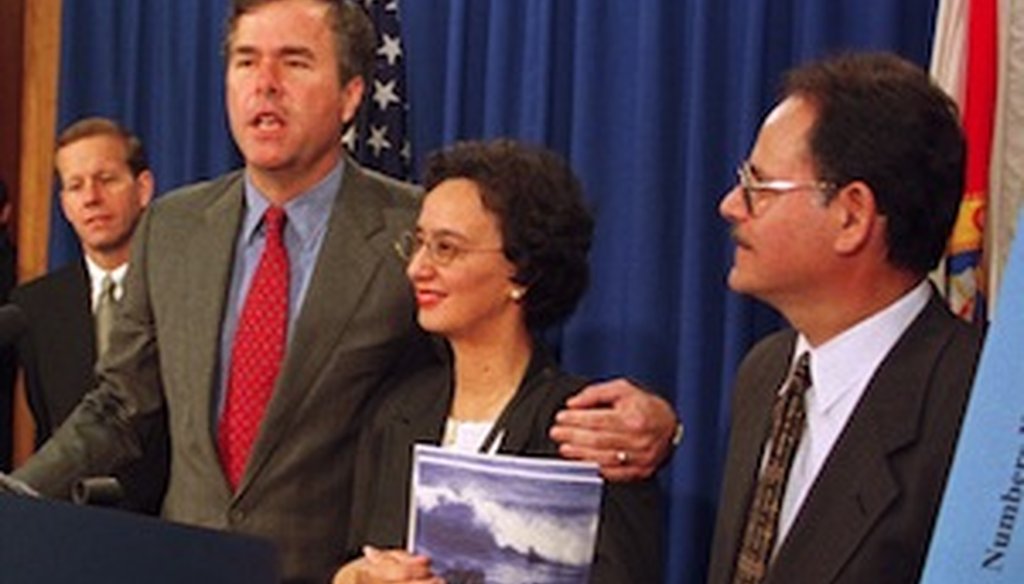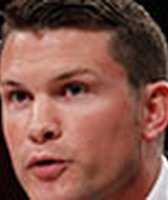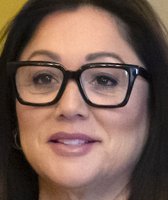Get PolitiFact in your inbox.

Then Gov. Jeb Bush placed his arm around Berthy De La Rosa-Aponte at a press conference in 1999. (Miami Herald photo)
After Republicans lost the White House two elections in a row, some leaders want to rebrand the party to show more compassion. Former Gov. Jeb Bush, speaking recently at the Conservative Political Action Conference, or CPAC, said conservatives need to remember that personal connection matters, too.
Bush shared a story about how a mother of a developmentally disabled child led him to change state policies to help such children.
Back in 1998, he said, the mother stood up at a meeting him and challenged him to do more.
"Over the next months that followed, I traveled south Florida with Berthy Aponte and visited group homes and talked to parents who feared nothing more than having their disabled child outlive them and become a ward of an uncaring state," Bush recalled.
"Imagine what it would be like to be a mom or a dad of a child and your biggest worry was that you would die before they did, and no one would take care of them. When I became governor, we had a renewed focus on helping the developmentally disabled. And in elevating their lives, I actually found out that we elevated the lives of all Floridians. All this flowed from my personal connection with Berthy."
Sign up for PolitiFact texts
If Bush runs for president in 2016, we can expect more discussion about his legacy on people with disabilities. (We noticed that Gov. Rick Scott, who is trying to make over his image, has proposed more money to help people with disabilities.)
We wanted to verify the details of Bush’s anecdote. We found he was accurate about his relationship with Aponte, but there were other factors, too -- most notably, multiple lawsuits filed against the state. Here then, is the rest of the story about Bush and the mother of the disabled child.
Bush meets the mom
The particulars of Bush’s comments were are accurate -- he did strike up a friendship with the mother of a disabled child, and he did commit millions in state money to the disabled.
Berthy De La Rosa-Aponte, who lives in Broward County, declined to speak to PolitiFact Florida in detail about Bush but said "what he said is the truth."
After Aponte met Bush, she invited him to her Broward home to meet with a group of parents of disabled children in the summer of 1998 while he was campaigning for governor, said Ellen Saideman, an attorney at the time for the Advocacy Center for Persons with Disabilities who sued the state seeking an expansion of Medicaid waivers to serve people in the community.
"He took time out of his day to come to this event where there were very few voters," said Saideman, a Democrat, who also attended. "He spent a few hours there. He was very kind, he spoke very well to parents both in English and Spanish."
(Jeb Bush might have in part inherited his interest. Bush’s father, George H.W. Bush, played a role in the national Medicaid waiver program, Saideman said. Then vice president George Bush learned about the case of Katie Beckett, who shortly after birth contracted encephalitis and was left partially paralyzed. The girl’s family wanted to care for her at home in Iowa and lobbied politicians for help, which grew into what became known as the Katie Beckett Waiver.)
The morning of election day, Bush visited the Cooper City High School classroom of Aponte’s disabled daughter. A few months after Bush won election, he stood with the girl’s mother as he announced a pledge of a $210 million increase to help thousands of Floridians on waiting lists. (Bush drew more publicity in 2001 when he sent Aponte, followed by a crew of TV cameras and sporting a "Let’s Go Jeb!" button, to file his paperwork for re-election.)
During Bush’s tenure, the budget for federal waiver programs for Floridians with disabilities would rise from $260 million in 1999-2000 to $861 million for 2006-07, according to records from the Agency for Persons with Disabilities. (Those figures include federal matching dollars and state tobacco settlement money.) Spending on institutions declined, while spending on community care soared.
Lawsuits a factor, too
Bush didn't mention in his speech that multiple lawsuits against the state were also a factor.
During his first year in office, Bush’s proposal for a massive cash injection came amid lawsuits filed by residents with disabilities who lacked services. Many were filed before Bush took office. In one case, a federal judge threatened to seize Florida’s Medicaid money if it didn’t care for the thousands on the waiting list.
Bush knew that the court system could force change on the state if he didn’t act.
"We have a responsibility here at the state level to provide these services," Bush said in 1999. "The worst thing in the world would be to have a federal judge, with the best of intentions, trying to run this system."
More funding didn’t solve all the problems. In 1999, the Miami Herald reported that parents and advocates were fighting over how to divvy up the money and the state lacked a plan on how to spend it. There were 23,000 on waiting lists for everything from institutional beds to physical therapy.
In one case in 2000, federal Judge Wilkie Ferguson held Florida in contempt of court for withholding services and fined the state $10,000 a day until it provided the services. (That fine was later reversed on appeal.)
That order stemmed from a 1992 case filed by 13 disabled Floridians on the waiting list. Ferguson had ruled in 1996 that they were entitled under Medicaid to get care in a state-funded institution. The ruling was upheld on appeal, but the state filed for more than 50 continuances while it sought money and a plan, the Herald reported.
"The state of Florida fought that lawsuit every step of the way...," Steve Weinger, the attorney for the plaintiffs, told PolitiFact Florida. "The expansion of services was based on the fact that the state had to comply with the court order."
Pat Wear, who was a deputy director at the Advocacy Center for Persons with Disabilities at the time, recalls a contentious period when the state Attorney General was defending the lawsuits.
"At some point a policy decision was clearly made within the Bush administration, that it wasn’t worth it to fight these lawsuits, and settlement discussions ensued," Wear said. "My personal opinion is we were making it hideously embarrassing for them to turn their backs on these people who were clearly the most vulnerable. It was a no-win for them to continue fight it in court."
Saideman said that she thinks Bush’s personal interest "was helpful to the settlement process."
Waiting list grows anyway
While the extra money Bush sought wiped out the waiting list, that didn’t last long. People who had never bothered seeking services due to the long waits now did, and the waiting list shot back up again.
"They've put new money in, yes," Max Bosman, a spokeswoman for the Florida Association of Rehabilitation Facilities, told the Herald in 2002. "Before Bush, the system was heading for an apocalypse. It's more like a volcano now, and any day we will have an eruption."
By 2004, the waiting list grew to 15,000. That year a state agency inspector general report found there was political favoritism in the order that people got services.
After Bush left office in January 2007, the deficits and waiting lists continued under Gov. Charlie Crist and then Gov. Rick Scott.
During his State of the State address in March, Scott said he was increasing funding by $36 million to reduce the waiting list. We rated that claim Mostly True -- the extra money Scott has proposed will help at least 750 people, but that still leaves about 21,000 on the waiting list.
Conclusion
Some of the experts we spoke with said multiple lawsuits forced Bush to invest more money to serve more disabled Floridians, and the system was still left with many problems.
Other advocates for people with disabilities -- including Democrats -- speak highly of Bush for meeting with families that often lack a political voice and for getting more money for community services. Bush inherited a troubled system with long waiting lists, which occurred before and after he was governor.
Marcia Beach is an attorney who sued the state on behalf of people with disabilities, as well as a former Democratic Broward county commissioner. She said that overall, Bush’s record on this topic can fairly be called conservative as well.
"I was always extremely grateful he was willing to put money into a program and make the necessary changes and advocate a shift in public policy from institutions to inclusion," she said. "If you think about the arguments it makes good sense. It really is a conservative philosophy if you can avoid higher costs in institutions, then you really get a better bang for your buck."
Our Sources
Former Gov. Jeb Bush, Conservative Political Action Conference speech, March 15, 2013
Global Universal Design Commission, Berthy de La Rosa-Aponte, Accessed March 29, 2013
Gov. Rick Scott press release, "Governor Scott announces $36 million for APD waiting list," Feb. 8, 2013
PolitiFact, "Rick Scott says $36 million for disability waiting list a first in eight years," March 7, 2013
New York Times, "Katie Beckett, who inspired health reform, dies at 34,"May 22, 2012
University of Colorado, State of the States Florida, 1977-2011
Florida Agency for Persons With Disabilities,Funding history, 2005-2014
Florida Agency for Persons with Disabilities,Overview to House Healthy Families subcommittee, Jan. 16, 2013
Florida Association of Rehabilitation Facilities,History of APD Medicaid waiver cuts, November 2012
Henry J. Kaiser Family Foundation State Health Facts, Waiting lists for HCBS Waivers, 2010
Florida Agency for Persons with Disabilities, i Budget Florida, Accessed March 7, 2013
Sun-Sentinel, "Mother of disabled teen launches Bush campaign,"July 6, 2011
Miami Herald, "No one will be left out," Accessed in Nexis, Oct. 21, 1999
Miami Herald, "Teen’s plight, Mom’s urging inspire change," Accessed in Nexis, Feb. 6, 1999
Miami Herald, "Funds for disabled sit untouched amid fights," Accessed in Nexis, April 26, 2009
Miami Herald, "Get out of court and get help to the disabled," Accessed in Nexis, Nov. 29, 1999
Miami Herald, "Bush makes it official: he is running," Accessed in Nexis, July 6, 2001
Miami Herald, "Deal on state aid to the disabled collapsing," Accessed in Nexis, April 21, 2002
Miami Herald, "Disabled Floridians linger on a waiting list," Accessed in Nexis, Jan. 22, 2002
Miami Herald, "Florida’s waiting list for aid to disabled is thousands long,"Feb. 21, 2003
Miami Herald, "DCF gives preferential care, report says," Aug. 18, 2004
Interview, Marcia Beach, former director of the Advocacy Center for Persons with Disabilities and a former Broward County commissioner and Broward judge, March 27, 2013
Interview, Pat Wear, former deputy director for the Advocacy Center for Persons with Disabilities, March 27, 2013
Interview, Steve Weinger, attorney, March 26, 2013
Interview, Ellen Saideman, attorney, March 28, 2013
Interview, Berthy De La Rosa-Aponte, March 25, 2013
Interview, Melanie Etters, spokeswoman for the Florida Agency for Persons with Disabilities, March 29, 2013








































